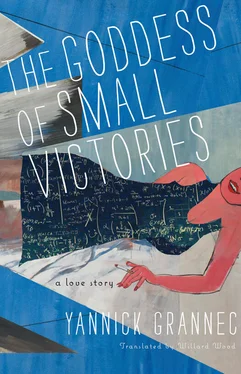“Miss Roth, how are you? And how is our darling little Adele?”
Mrs. Gödel, who must have weighed twice as much as Gladys and been her elder by five or six years, rolled her eyes.
“ Machen Sie bitte kurz! ” Cut this short, for God’s sake!
“What did she say?”
“She needs to go to the bathroom.”
They set off at a gallop toward the elevators. The doors opened on a phalanx of white coats in a cloud of cigarette smoke and disinfectant. The young woman hesitated over the worn letters before choosing a floor. Adele punched the right button with a practiced thumb.
“People like Gladys are vampires, Anna. You won’t survive in this world if you don’t learn to be rude to such monsters.”
“I’m clearly in the hands of a master.”
They circled around the lawn, ignoring the few patients and the fewer visitors taking the air, and hid behind an ancient maple tree. From her bottomless bag, Anna fished out a thermos, a package of cinnamon biscuits, and a flask.
“Hallelujah! You have a bit of Mary Poppins in you. Not too early for a cocktail, even with all your principles?”
“It’s nighttime in Vienna.”
Anna poured two teas laced with bourbon. Adele swirled her drink, muttering about the overly reasonable dose of alcohol. They clinked plastic cups. “Look me in the eyes, young lady, or else toasting means nothing. To Vienna! One day, you will kiss the city for me.” A golden light clung to the dust motes dancing in the air. Anna had the momentary sensation of being, for once, in the right place at the right time. Adele downed her cocktail. “I spent half my life in this type of prison. On either side of the curtain. When I was a visitor, I would go to the movies to clear my head afterward.” She held out her cup. Anna obliged with more generosity and less tea. “What do you do when you leave here, to get away from all this old age?”
The young woman examined the amber dregs of her cup and opted for the simple truth. “A hot bath, a glass of white wine, and a book.”
“All at once?”
“It’s good to live dangerously.”
“I never enjoyed reading. I always had trouble concentrating. I would get antsy and read the same sentence three times. Kurt, though, withdrew into his books. Books were an additional barrier between us.”
She rested the cup precariously on her knees. Making eyeglasses with her fingers, she spoke in a shrill voice. “ I am elsewhere, do not try to bother me . It would reach the point where I had to escape the silence, join the movement of a crowd. I would end up at the movies. You can’t imagine how much I miss going to the movies.”
Anna responded impulsively, regretting it even as she spoke.
“What if I asked for permission to take you to the movies?”
“I am adding you this minute to my will! My huge and unfortunate backside has been Scotch-taped to reality far too long.”
The young woman started to think of all the difficulties entailed by her offer. She poured a second shot of bourbon into her lukewarm cup.
“I didn’t destroy those papers, Anna. But don’t think I am telling you this because you offered to take me for an outing. I am not one of those fast women!”
“Nor am I, Adele. Nor am I.”
The old lady smacked her lips.
“What good movies are around at this moment?”
“ Manhattan is playing. A black-and-white film by the New York director Woody Allen.”
“I’ve heard of him. He is too intellectual for me. It feels as if my whole life has been spent in a black-and-white film. A silent film, almost! Great God Almighty, I want a Technicolor screen! With music! Why does Hollywood not make musicals anymore?”
“I’m not that fond of musicals, to tell you the truth.”
“Too popular for you? Her Majesty prefers French films, I suppose.”
“Where do you get the right to judge me?”
“Poor thing. I was judged all my life. Stupid, vulgar, inept. Never up to the mark. I cried, I kicked against those closed doors, but I was always ‘that Austrian woman.’ Princeton was not my world. One day I said ‘Scheisse! ’ Shit! I stuck a pink flamingo in the middle of our garden. Can you imagine people’s reaction? A pink flamingo at the house of Kurt Gödel … It made his mother swallow her string of pearls. And it did me a world of good. I like musical comedy. I like love songs and paintings with pretty colors. I don’t read. And you can all go to hell! If you want to see depressing films or have a little drink before sunset, Anna, you are free to do it. What counts is joy. Joy!”
“What did your husband think of the pink flamingo?”
“Did he even know we had a garden?”
Love means that you’re the knife I use to probe inside of me.
— Franz Kafka, in a letter to Milena
With the complicity of the nurse, I was able to visit Kurt during the months of his first stay in the sanatorium despite his family’s disapproval. Anna was the daughter of Russian immigrants. Her parents, who were household servants, had followed their masters in flight from the Bolshevik menace. She had married for love a Viennese clockmaker with a store on the Kohlmarkt, a few steps from the Café Demel. Her parents-in-law, strict Catholics, never accepted their son’s choice of a Jewish bride. When the clockmaker died of tuberculosis shortly after a son was born, Anna was left with a small child on her hands and a senile father. It was a miracle that she had found the job at Purkersdorf, where she lived in a tiny maid’s room. Her salary barely covered the cost of a wet nurse for her son and hospice care for her father. She saw the boy, Peter, only once a month, riding her bicycle far out into the countryside to visit him. She often showed me photographs of her little man, who had his mother’s red hair and, presumably, his father’s dark eyes. Anna masked her Russian accent under a thick Viennese brogue, but she couldn’t hide her Slavic origins: she had a round face with strong cheekbones and pale eyes pulled into a permanent smile. Her flaming and unruly hair stood out a mile away; she never passed unnoticed. I’d forbidden her to dye her hair blond, as I envied the luxuriant thatch she had such trouble keeping under her white cap. Her life was far more difficult than mine, yet she never complained. She knew how to listen and asked for nothing in return. Our acquaintance was too slight for me to be dishonest with her. After every meeting with Kurt I would run and hide behind the building to cry, bemoaning my fate and my inability to help. He was so thin, so weak. Anna would roll cigarettes for me and wipe my mascara-streaked cheeks without comment. Only once did she give me advice: “If their drugs really worked, we’d know it. It’s not a secret. What your man truly needs is love. You’re going to have to reach down and deliver, sweetie.”
I visited every day, waiting for hours by the service entrance to spend a few minutes alone with Kurt. The Gödels knew about our furtive meetings, as my man had no talent for deception, but they’d been unable to derail what they took for little more than a passing fancy, which was to be swept away, along with the whole sorry business, by denial.
When Kurt recovered a semblance of health, his mother sent him to a spa across the border in Yugoslavia for a rest cure. I fretted in Vienna all summer. Kurt came back in excellent form and newly confident in his future: he had been recruited by Oswald Veblen, the mathematician, to give a series of lectures at Princeton’s Institute for Advanced Study.
The IAS had been founded four years earlier by a wealthy philanthropist, Louis Bamberger, and his sister. They had sold their chain of department stores to Macy’s a few days before the stock market crash of 1929 and used the proceeds to start a foundation dedicated to pure research. The times were ripe for poaching from European universities — the intelligentsia were climbing all over each other to get out the door and reach America safely. A newly minted doctor of sciences in Vienna was entitled to only the unpaid position of Privatdozent . Kurt refused to consider working in the private sector as an engineer; the idea made him laugh — when it didn’t make him sick. Aside from recognition, the invitation from the United States offered him a path to a brilliant academic career and true financial independence. Its cost would be our separation.
Читать дальше












